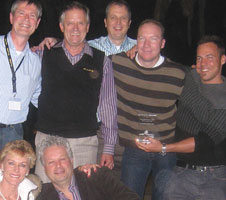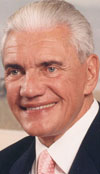
Africa
Comtest was presented with the 'Top Performer 2008' award for the Fluke industrial portfolio at a recent Fluke distributor meeting held in Barcelona. This is the fourth consecutive year that Comtest has been presented with this award. Pictured are [back from left]: Jos Meinema (Fluke export sales manager), Peter Verwer (Comtest MD), Bert Vellema (Fluke sales manager – export), Gavin van Rooy (Comtest dealer manager), Brendan Campbell (Comtest product manager); [front from left]: Val Verwer (Comtest marketing director) and Hans de Laat (Fluke marketing manager EEMEA).

Orange Guinea Conakry and Ericsson are deploying more than 100 base stations fully powered by solar energy, connecting remote parts of rural Africa. Using Ericsson’s energy-efficient base stations, a hybrid diesel-battery solution and solar panels, Orange is increasing mobile coverage in rural and urban areas, while taking concrete steps towards its target of reducing CO2 emissions by 20% by 2020. This provides remote areas without an established power grid with access to mobile communications.
Meissner recently opened its new factory in Wadeville, close to Johannesburg. Mark Wilson, CEO of Alstom Electrical Industries South Africa (of which Meissner is a business unit) was guest of honour at the official opening on 30 January. In order to adapt to growth, capacity expansion became necessary and Meissner recently acquired a 6600 square metre warehouse situated adjacent to its existing facility, which will provide the company with a factory floor area four times bigger than it previously enjoyed.

Altron Group founder and chairman, Dr Bill Venter, has been recognised by government and industry for his significant contribution to technology over the past 45 years. Venter was presented with a Lifetime Achiever Award by the minister of Science and Technology, Mr Mosibudi Mangena, at the Technology Top 100 companies awards held at the Victory Theatre in Johannesburg recently. Venter founded Altron in 1965 with capital of just R40 000. The JSE listed technology group now has sales of R21 billion a year and employs 14 000 persons locally and abroad.

Ericsson has been awarded a R1 billion tender by the City of Johannesburg to help establish a city-wide, high-speed broadband network. The first phase of the ‘Joburg Broadband Network Project’, the rolling out of the network’s fibre core, which will take around three years to complete, will begin in earnest on the 1st of April this year.
Overseas
Business
Analog Devices has announced financial results for the first quarter of fiscal 2009, which ended 31 January. Revenue was $477 million, a decline of 28% from the immediately prior quarter and 22% from the same period one year ago. Diluted earnings per share (EPS) from continuing operations were $0,08, compared to $0,49 in the immediately prior quarter, and $0,40 in the same period a year ago. These financial results include restructuring charges of $42 million, or $0,10 per share.
Silicon Laboratories has reported fourth quarter revenue of $99,3 million, bringing year-end revenue to $415,6 million, a 23% year over year increase. This fourth quarter revenue was, however, lower by 12,5% than the previous quarter. Diluted earnings per share for the year were $0,67.
Spansion has announced that it will cut its workforce by approximately 3000 employees, or 35%. The majority of the positions affected are at Spansion’s global manufacturing sites, as the company resizes due to current market conditions. The company expects that when complete, this reduction in force will result in approximately $25 million in cash charges, during the first half of 2009. The company believes this reduction in force will provide it with annual cash cost savings of approximately $225 million.
As a result of deteriorating economic conditions and decreased demand for 200 mm specialty DRAM products, Micron announced that it will phase out 200 mm wafer manufacturing operations at the company’s Boise facility. This action will reduce employment by approximately 500 employees in the near term and as many as 2000 positions by the end of the company’s fiscal year.
Hittite reported revenue for its fourth fiscal quarter, ended 31 December 2008, of $46,4 million, representing an increase of 9,2% compared with the fourth quarter of 2007 and an increase of 1,9% compared with the third quarter of 2008. Net income for the quarter was $13,6 million, or $0,45 per diluted share, an increase of 1,9% compared with $13,4 million, or $0,43 per diluted share, for the fourth quarter of 2007, and a decrease of 0,5% compared with $13,7 million, or $0,44 per diluted share, for the third quarter of 2008.
Announcing financial results for its fourth quarter and year ended 31 December 2008, Silicon Storage Technology reported net revenues for the quarter of $58,4 million compared with $92,4 million in the third quarter of 2008 and with $107,4 million in the fourth quarter of 2007. Net revenues for the year were $315,5 million compared with $411,7 million for the previous year. Net loss for the year was $32,9 million, or $0,33 per share, compared to a net loss of $49,0 million, or $0,47 per share reported in 2007.
Agilent Technologies reported revenues of $1,17 billion for the first fiscal quarter ended 31 January, 16% less than one year ago. GAAP net income was $64 million, or $0,18 per diluted share, compared to last year’s first quarter GAAP net income of $120 million, or $0,31 per share. Revenues were down across the globe, with the Americas off 10%, Europe off 21% and Asia down 18% from one year ago. By segment, semiconductor and board test was the hardest hit, off 49% from last year, while electronic measurement was down 23%.
Austriamicrosystems’ revenues for fiscal year 2008 reached 184,7 million Euros, 4,7% lower than the previous year’s revenues, or 2,2% lower when currency fluctuations are taken into account. Revenues for the fourth quarter of 2008 were 43,2 million Euros, 27,4% lower than the 59,5 million Euros recorded in the same quarter of 2007. EBIT for the year decreased by 3 million Euros to 25 million Euros, which is 10,7% lower than full year 2007.
International Rectifier reported revenue for the fiscal second quarter of 2009, ended 31 December 2008, of $189,7 million. Excluding intellectual property and transition services segment revenue, fiscal second quarter 2009 revenue from ongoing customer segments was $175,8 million, down 17% compared with $212,1 million in the prior quarter and down 26% compared with $237,4 million reported in the second quarter of 2008. Net loss was $186,1 million, or $2,56 per share, compared with a net loss of $4,5 million or $0,06 per share in the prior quarter, and net income of $313 000 or $0,00 per share in the similar period a year ago.
Companies
Analog Devices has filed a patent infringement lawsuit against Hittite, asserting that products from Hittite’s range of RF detectors infringe Analog Devices’ patented technology. Through this lawsuit, Analog Devices is seeking an injunction against Hittite, in addition to compensatory damages, interest and fees.
Wind River has signed an agreement to acquire privately-held Tilcon Software, a provider of software for creating and deploying graphical user interfaces in embedded devices. Wind River aims to use the acquired technology to enhance the value of VxWorks and Wind River Linux software platforms across multiple device types and target vertical markets. Under the terms of the agreement, Wind River will pay approximately $3,5 million in cash to acquire all outstanding capital stock of Tilcon.
Industry
42% of responding companies cited changes in their customers’ sourcing patterns from Asia back to North America or Europe in the past two years, according to the results of a survey conducted by IPC. 50 companies responding to the survey estimated that an average of 2,5% growth in their 2007 and 2008 business was attributable to this trend. The issue that was cited most often as the primary driver of this trend was quality concerns. Other key contributors were transportation costs, currency exchange rates, long supply lines and communication difficulties.
The GSM Association and 17 leading mobile operators and manufacturers have committed to implementing a cross-industry standard for a universal charger for new mobile phones. The aim of the initiative is to ensure that the mobile industry adopts a common format for mobile phone charger connections and energy-efficient chargers, resulting in an estimated 50% reduction in standby energy consumption, the potential elimination of up to 45 000 tons of duplicate chargers and the enhancement of the customer experience by simplifying the charging of mobile phones.
The SOI Industry Consortium, aimed at accelerating silicon-on-insulator (SOI) innovation into broad markets, announced that IMEC has joined the organisation as an academic member. IMEC, a world-leading independent nanoelectronics research centre headquartered in Belgium, has been active in the field of SOI technologies for more than two decades.
The mobile data infrastructure market is forecast to experience a double digit decline in revenues in 2009, according to a recent study by IMS Research. Mobile WiMAX may be hardest hit as credit markets dry up, jeopardising many of the smaller pure WiMAX vendors’ most important customers. Coincidentally, this economic downturn comes at a time when many operators are outlining their plans to either upgrade their existing 3G networks or migrate to next generation networks. Before the economic crash, many thought 2009 would be a year defined by aggressive expansion of mobile data networks and large investments in 4G.
MIPS Technologies has joined the Linux Foundation, a non-profit organisation dedicated to accelerating the growth of Linux. MIPS Technologies is a provider of industry-standard architectures, processors and analog IP for digital consumer, home networking, wireless, communications and business applications.
© Technews Publishing (Pty) Ltd | All Rights Reserved